- Home
- Bridget Barton
Once Upon a Dreamy Match: A Historical Regency Romance Book Page 17
Once Upon a Dreamy Match: A Historical Regency Romance Book Read online
Page 17
But whatever it was that she used to feel for him had grown. At first it was a steady growth, measured and natural. However, there was not a single thing about this trip that had happened slowly.
She crossed the room to the window that overlooked the small garden the Gildon’s kept at the back of their London property. As she looked out over the peonies and roses, so stark and bright against the surrounding grey, it was like looking out her own back window at the garden Benedict had arranged be planted in her honour.
Her lips parted, frosting the glass. “I am in love with him.”
Just then, rain began to fall, as if those very words had caused the heavens to open up at last and finally unleash. The words were out in the universe now; there was no taking back this confession. Daphne raised a hand to her heart as she looked on at the garden and the rain that slowly began to beat down in silvery sheets.
This was her truth: she had been in love with her best friend for most of their lives, and yet she had no idea what his feelings were for her. Over the past few weeks there had been more moments than ever before where she had caught something wistful in his eye, but she had never dared to stop and think too hard on what it meant.
How could she? He was a Lord, and she was just a merchant’s daughter. They had always been neighbours and friends and nothing more. Just a few weeks ago, Lady Vivian, who had been a second mother to Daphne for much of her young life, had spoken words of scorn down on her.
“It would not be an acceptable pairing,” her Ladyship had said. “She is not gentry, my son. Your marriage must be within our own class. It is the natural order of things.”
The natural order of things. She could almost laugh. Look how much things had changed: the very woman who had dismissed her as ever being worthy of her son was now marrying the merchant himself. Her outlook on Daphne had changed dramatically ever since money had become involved. Was that all that would ever be important? Money? Did status and wealth mean so much to these people that they overlooked things like happiness and love?
It certainly seemed the case, for Benedict was drawn to Lady Parker. She was his equal in every way: beautiful, well-bred, eloquent and a picture of propriety. She reeked of old money and spat nothing but pretentiousness, but she was Benedict’s natural order.
In the fog of her breath, Daphne drew the shape of a heart in the window. Before she could let it fade away on the pane, she swiped her fingers through it.
It wouldn’t matter anyway, she told herself. Even if Lady Parker wasn’t involved, with our parents wed, we could never be together. Even if…even if we both wanted it.
But Benedict didn’t want her like that, did he? He had never even asked her to a ball beyond what was expected of him as a chaperone. Not once had he ever shown her familiarity beyond that of friends.
But that embrace…
Ah, yes. That embrace. The way he had turned at the sound of her voice, the way he held her in his arms. Nowhere in the world was safer than in Lord Benedict Gildon’s arms. When he was by her side, nothing could truly harm her. No matter how small or weak or overcome by grief she was, Benedict’s very presence filled her with strength.
She shook her head. Stop it. You’re being silly. Taking a moment to look around herself and ensure that her personal musings were not being overheard by the staff, she strode into the drawing room where she happened upon a maid. Glad to be distracted by the appearance of another person, she asked her if she would fetch some tea.
“Yes, Miss Daphne,” the maid replied. She hesitated for a moment before adding, “Will you be staying on in London with us?”
Try as she might have to quash the rumours that surrounded her father, Lady Vivian had stoked a fire of her own. The scandalous relationship between the Lady of Hedingham and her merchant neighbour was already the new gossip of town. Any hope that she could ever truly be worthy of Benedict was gone. He was too decent a person to be associated with Daphne, whose name would be marred.
Daphne took a breath. She knew enough of her father’s goings-on to know that he had not received an annulment from Roberta; she also knew that he had not sent one to her, which meant that their engagements to other people were fraught with social impropriety. It seemed that every decision that was being made around her was just one more branch on the fire that was quickly burning up Daphne’s life.
“No,” Daphne replied, the decision coming to her at once. “I will return to Essex with my father.
The maid nodded. “He is leaving today, Miss Daphne. Will I arrange for your things to be packed?”
“Yes, please do.” She turned back to the rain as it intensified; it was spearing at the window with such force that the noise drowned out the thoughts that were attempting to resurface. “We will be leaving as soon as the rain stops.”
***
What Benedict must have thought when he had returned that evening to find that his London company had left him for Essex, Daphne did not know. Was it cowardice that had prompted to her to flee without a word to him, or was it convenience? In her heart, sore as it was, she knew that this was the best decision; her fear of goodbyes could not be realised if no goodbye was had.
She and her father sat alone in the dining room to share their modest welcome-home breakfast. Greta was glad to see them home – for it meant cooking for persons other than the boys – and she and Matilda had ushered Mr. and Miss Blanton inside from the rain late in the evening when the carriage had finally arrived home. The grey sky still lingered, but Daphne was at least glad that this sky was familiar to her. She was home, though if she had been looking for some kind of relief, she did not find it here. She felt emptier than ever.
“Did you hear me, Daffodil?”
Lowering her gaze from the window, she tried to bring her attention back to the conversation at hand. Her father looked at her from over the rim of his teacup, his eyes wide and his mouth smiling.
She mustered one of her own. “I am sorry, father. Please, could you repeat that?”
“I said we had quite the adventure, did we not? Though I must admit I am not entirely aware of what kind of activity you got up to in London, at least the times I was not present. But really, I am so glad I went. To think that the Lady Vivian and I would finally allow our long-time friendship to transcend…I would have sold my trade investments years ago had I known that was all it took.”
“Father!”
He waved her away with, “Oh, hush Daphne. You know as well as I the motivations for each of us. How flattering it is to have a Lady on my arm, and our new-found wealth has brought along with it all the benefits of a fresh start.” He chuckled as he broke into the bread, his puffy cheeks flushed with glee. “To think that, after all this, I would be getting married before my daughter…”
“I will not marry.” Daphne went back to filling her view with the outside world. A single, solitary crow landed on the garden fence to caw at nothing at particular.
“What did you say?”
She did not look away from the black bird. He hopped along the wooden fence with head inclined toward the ground. After pausing for just a moment of consideration, he drove straight into the soft earth and emerged with a poor cricket trapped in his beak. As Daphne looked on, the bird devoured his breakfast then turned to look her straight in the face. He did not caw or flutter or blink, just stared right back at the green-eyed woman in the window. Take them, before they take you, he seemed to say. Or you’ll be doomed, too.
Daphne shuddered and came back to the table. “I said I will not be getting married.”
“Giving up so soon, are you? And after the large dowry I boasted for you?”
“You can use that money for your own wedding,” she said. Then, more quietly and far more bitterly, she added, “I am sure that yourself and Lady Vivian will find clever ways to spend it.”
To her surprise, her father laughed. “Oh, you are probably right about that. I find myself excited for the first time in a long time, Daffodil. All this money and p
ower is new to me. Ever since I asked Lady Vivian for her hand, I have been dreaming up the ways in which I will be spending my days as a fancy Lord.” He took a moment to ruminate on that, that strange smile always plastered on his face. It was beginning to look as if it were painted on.
Daphne was of two minds: of course she was happy that her father had finally been pulled from his emotional rut and that the memory of Roberta had been quashed; but at the same time, her father’s motivations for his perusal of Lady Vivian were shallow and fleeting. He was a man who loved deeply and passionately and needed that love returned. As much as she respected Lady Vivian, she was not the right woman for her father, and Mr. Blanton was certainly not of the same calibre as his Lady betrothed. That was not part of any natural order.
“But Daphne, what does that mean for you?” her father asked. “If you have no plans for marriage, what do you have plans for?”
Daphne had survived the entire ride from London to Hedingham thinking about that. Taking a sip of her tea, she relayed her decision to her father: “I would rather put myself to work in a foreign land than bring shame to any future husband of mine here in England. Surely finding work as a governess would not be altogether too difficult, especially abroad.”
“You know that I will never force your hand, Daffodil. If marriage is no longer your desire, I will not encourage you to pursue it,” her father replied, entirely glossing over her comment about shame. Ever-oblivious – at least he was predictable in that sense.
Had he truly no idea the grief he had caused her? Did he not comprehend that it was he who had already forced his daughter away from marriage through his antics? Though she loved her father dearly and with all her heart, this facile chase of his own wayward dreams had left Daphne with no choice but to relinquish her own.
“There is nothing left for me in Essex any longer, and it has been seen to that there is now nothing in London, either.” Daphne set her half-finished tea down. “If I want to have a comfortable life, it appears that I will be carving one out on my own.”
Mr. Blanton applied a heaping smear of butter to more bread. “Perhaps you could immigrate to the West Indies.”
“The West Indies?”
“Yes,” he said, nonchalant. “As you know, I’m quite familiar with that region due to my many years of travels there. It is actually where a large portion of my investments are tied up. A very lucrative part of the world indeed.” He took a moment to laugh at a private joke before biting into his indulgent bread.
Daphne frowned at him. “What kind of place is the West Indies for a young woman?”
“Oh, a grand place!” her father exclaimed. “It is a place ripe with opportunity, Daffodil. You could be a woman of independent means out there – something you could never accomplish in England.”
A woman of independent means? She knew little of the region except for what her father had relayed to her in his stories over the years. It was a beautiful part of the world with crystal waters and lush jungles, only moderately commercialised by white men. Her father had always talked of the intriguing culture of the native peoples, whose relationship with their colonisers was ever evolving.
It was not something she had previously even considered, for where would an English woman have a place in the West Indies? The prospect of finding out, however, spurred her curiosity. It would be an undeniably fresh start – she could forget about her life in England. Across the sea, she could be anyone she wanted.
“Of course, no scandalous chatter of my daughter earning a wage would ever reach my doorstep,” Mr. Blanton added suddenly. “You would bring me no shame, Daphne, no matter how much money you managed to earn over there. How freeing a concept!”
Daphne rose from the table and crossed to the far window, needing a moment to catch her breath. So those were her options, then? Stay on in England and live in eternal shame at the hand of her silly father, whose Blanton name was forever-tarnished by his multiple London scandals; or move across the world and start all over again, alone and isolated, but free of social consequence? The audacity of her father was astounding. Could he never keep his thoughts to himself? He lived with a perpetual phantom foot in his mouth.
“Dear God, father,” she pronounced before she could stop herself. She whirled from the window to face him. He had paused mid-bite and had a glob of butter on his chin. “You have doomed me, do you realise that? How did I ever become so entangled in your silly ideas? Your crazy pursuits? Have you ever even once stopped to reflect on how your actions affect other people?”
Her father stared at his daughter, mute and still. His silence only encouraged Daphne to continue – when would she ever have another chance to be honest?
“You have had one wife too many, and each time your ambition has grown well beyond your means. Your old age has gotten the better of you at last, and one can only marvel as to how you have any coin left to spend at all! Certainly, if you marry Lady Vivian all your funds will be sucked away. You have no idea what you are doing – I doubt you ever have. You’re as clueless as a child sometimes, but this debacle with the Gildons is the turret on your castle of stupidity.”
The moment of silence dragged on for the longest stretch of time imaginable. Facing off like enemies on a battlefield, Daphne’s pulse hammered in her throat. Mr. Blanton looked caught between wanting to keep quiet and wanting to yell right back.
She had never before spoken out of turn like this – that was the attitude of Jasper and Lionel, not of his Daffodil, who was always so good and so placid and so quiet. Well, not anymore! It was high time someone actually stood up for themselves, and if she was going to be leaving for a foreign land anyway, then now was her last chance to air her pent-up thoughts.
The butter on her father’s face slid into the tangles of his beard where it slowly began to melt. Trickling through the wiry hairs like water through bracken, Daphne watched as a single, golden drop fell from its entrapment and landed on his pants. Despite herself, she giggled.
As her laughter interjected the quiet between them, her father looked down at his leg, wiped a hand through his buttery beard and pulled it away to inspect. Looking back at his daughter, who had her hand clapped over her mouth, he, too, then broke into laughter.
She had been wanting to say those word for so long, even before their trip to London. He was just a silly old man doing his best to try and stay happy in a world where it was becoming increasingly difficult to do so. Life was fleeting, as they both knew good and well. Daphne could only wonder how different their lives would be if her mother was still alive, but she had long-accepted that she ought to let go of those thoughts.
This was her reality: scandalous due to no fault of her own, and fraught with too many feelings to contend with. So if he father suggested she run away to the West Indies and start a new life as an independent woman to be free of his rash and thoughtless actions, then perhaps that is exactly what she ought to do.
“My word, Daffodil,” her father said at last, wiping a tear from his eye. Both their faces were flushed from laughing. “How long had you been preparing that speech?”
Daphne returned to her seat at the table. “The first edition was scripted years ago.”
“I bet it was!”
They took some time to compose themselves. Prudence ventured in, looking confused and slightly nervous by the craziness of her employers. She cleared the table without a word while Daphne and her father continued chuckling wordlessly.
“If I had known that is how my proclamation would have been received,” Daphne said with a sigh, “I would have recited it ages ago.”
“But if you had, you would only have had to write a second one to encapsulate our time in London.” Mr. Blanton stretched his arms over his head and rubbed at his full belly. “Look, Daffodil, I know that you have found me to be especially silly of late. In truth, I have been quite lost and looking for anything that would bring me comfort. Perhaps I was wrong about Roberta – in fact, it is finally clear to me now that
I was certainly wrong to fall for her and bring her into our home – but I do not believe I am wrong about Vivian.”

 A Lady's Perfect Match: A Historical Regency Romance Book
A Lady's Perfect Match: A Historical Regency Romance Book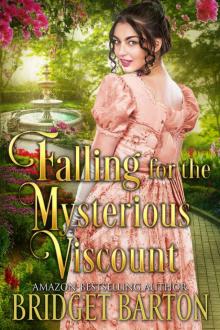 Falling for the Mysterious Viscount: A Historical Regency Romance Book
Falling for the Mysterious Viscount: A Historical Regency Romance Book Love Stories of Enchanting Ladies: A Historical Regency Romance Collection
Love Stories of Enchanting Ladies: A Historical Regency Romance Collection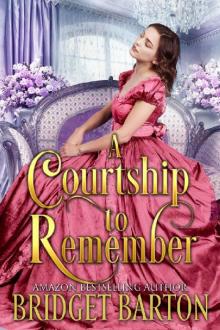 A Courtship to Remember: A Historical Regency Romance Book
A Courtship to Remember: A Historical Regency Romance Book Longing for a Liberating Love: A Historical Regency Romance Book
Longing for a Liberating Love: A Historical Regency Romance Book Regency Romance Collection
Regency Romance Collection A Baron Worth Loving: A Historical Regency Romance Book
A Baron Worth Loving: A Historical Regency Romance Book Lords to Be Enamored With: A Historical Regency Romance Collection
Lords to Be Enamored With: A Historical Regency Romance Collection A Lady for the Forsaken Earl: A Historical Regency Romance Book
A Lady for the Forsaken Earl: A Historical Regency Romance Book Dukes to Fall in Love With: A Historical Regency Romance Collection
Dukes to Fall in Love With: A Historical Regency Romance Collection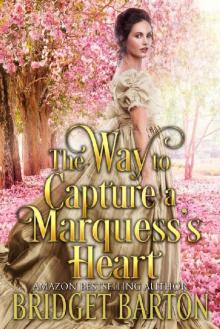 The Way to Capture a Marquess's Heart: A Historical Regency Romance Book
The Way to Capture a Marquess's Heart: A Historical Regency Romance Book The Lost Love of a Stunning Lady: A Historical Regency Romance Book
The Lost Love of a Stunning Lady: A Historical Regency Romance Book Once Upon a Dreamy Match: A Historical Regency Romance Book
Once Upon a Dreamy Match: A Historical Regency Romance Book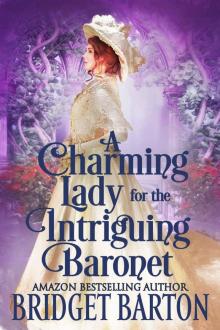 A Charming Lady for the Intriguing Baronet: A Historical Regency Romance Book
A Charming Lady for the Intriguing Baronet: A Historical Regency Romance Book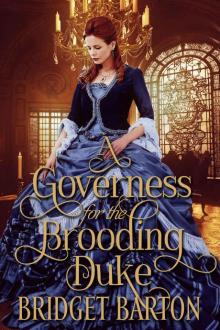 A Governess for the Brooding Duke: A Historical Regency Romance Book
A Governess for the Brooding Duke: A Historical Regency Romance Book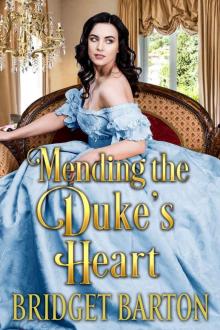 Mending the Duke's Heart: A Historical Regency Romance Book
Mending the Duke's Heart: A Historical Regency Romance Book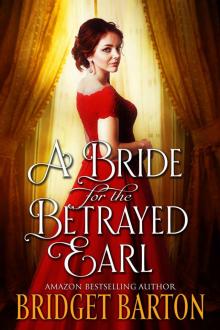 A Bride for the Betrayed Earl
A Bride for the Betrayed Earl A Soulmate for the Heartbroken Duke
A Soulmate for the Heartbroken Duke A Lady for the Brazen Earl: A Historical Regency Romance Book
A Lady for the Brazen Earl: A Historical Regency Romance Book For the Love of a Duchess: A Historical Regency Romance Book
For the Love of a Duchess: A Historical Regency Romance Book A Damsel for the Mysterious Duke: A Historical Regency Romance Book
A Damsel for the Mysterious Duke: A Historical Regency Romance Book The Revenge of the Betrayed Duke: A Historical Regency Romance Book
The Revenge of the Betrayed Duke: A Historical Regency Romance Book A Damsel for the Daring Duke
A Damsel for the Daring Duke Regency Romance Collection: Regency Fire: The Historical Regency Romance Complete Series (Books 1-5)
Regency Romance Collection: Regency Fire: The Historical Regency Romance Complete Series (Books 1-5) A Damsel for the Mysterious Duke_A Historical Regency Romance
A Damsel for the Mysterious Duke_A Historical Regency Romance A Damsel for the Daring Duke_A Historical Regency Romance
A Damsel for the Daring Duke_A Historical Regency Romance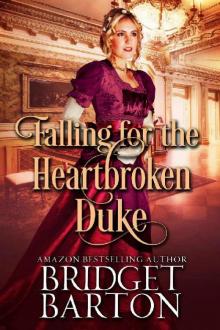 Falling for the Heartbroken Duke: A Historical Regency Romance Book
Falling for the Heartbroken Duke: A Historical Regency Romance Book A Soulmate for the Heartbroken Duke: A Historical Regency Romance Book
A Soulmate for the Heartbroken Duke: A Historical Regency Romance Book A Damsel for the Daring Duke: A Historical Regency Romance Book
A Damsel for the Daring Duke: A Historical Regency Romance Book A Soulmate for the Heartbroken Duke_A Historical Regency Romance
A Soulmate for the Heartbroken Duke_A Historical Regency Romance A Damsel for the Mysterious Duke
A Damsel for the Mysterious Duke A Beauty for the Scarred Duke: A Historical Regency Romance Book
A Beauty for the Scarred Duke: A Historical Regency Romance Book Kind Ella and the Charming Duke_A Historical Regency Romance
Kind Ella and the Charming Duke_A Historical Regency Romance Kind Ella and the Charming Duke
Kind Ella and the Charming Duke